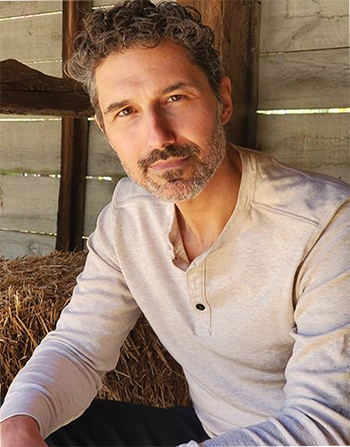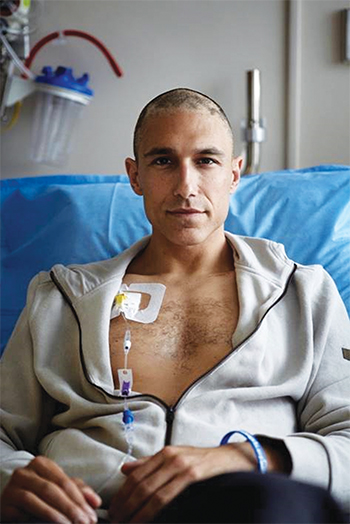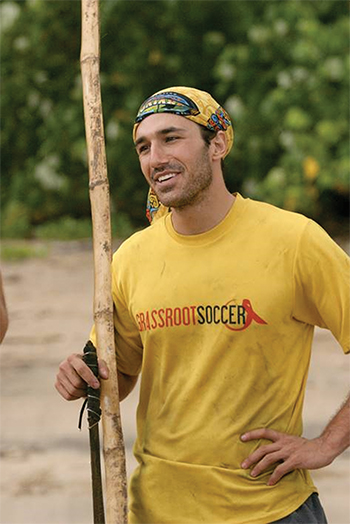Hodgkin Lymphoma Survivor
Meet Ethan Zohn, a Survivor in every sense of the word

To win the reality television show Survivor: Africa in 2002, Ethan Zohn showed incredible physical, mental and spiritual endurance. The former professional soccer player drew on those assets seven years later when he was faced with his biggest challenge of all: surviving Hodgkin lymphoma. Today, Ethan continues to help other patients and their loved ones by sharing his story and inspiring hope.
¬Really itchy skin was Ethan Zohn’s first indication that something was not right. After pills, creams and lotions didn’t make a difference, his doctor performed tests that revealed a 6 cm by 12 cm mass in his chest. Biopsy results determined the mass and a lymph node by his left clavicle were caused by a type of Hodgkin lymphoma.
Though the prognosis was good, Ethan was shaken by the diagnosis.
“I was 35, and I felt as if the rug was pulled out from under me,” he said. “I lost my dad to colorectal cancer when I was 14, and that was my only experience with cancer. In my mind, cancer equaled death.”
Ethan was no stranger to pushing his body to the limits. His career as a professional soccer player, along with literally surviving in the desert during Survivor: Africa, helped prepare him for the battle ahead. However, he couldn’t have gotten through it without the support of others.
“My family is incredible. I remembered their support when my dad was sick, and I knew I could count on them. They have always surrounded me with so much love,” he explained.
He soon realized he needed support from someone who knew exactly what he was going through. At first, it was difficult for him to be vulnerable and ask for help, but he decided to reach out to a peer-to-peer cancer group called Imerman’s Angels. He was matched with his own “angel,” a mentor he could talk to one-on-one. It was so helpful that he later became an angel as well to help others.
Ethan lived in New York City and sought treatment from a well-known cancer center there. The maximum dose of chemotherapy, 22 radiation therapy treatments and an autologous stem cell transplant combined to put him in remission. Though treatment was successful, he had to be careful for a period following the transplant because of the risk of infection, which left him feeling extremely isolated and lonely. He mostly stayed in his apartment while his friends were moving on with their lives, getting married and having kids.
“I had to press pause on my life, and it was scary. It probably didn’t help that I was recuperating in a 640-square-foot apartment,” he said.
Anxiety that he might relapse plagued Ethan. Then, in 2011, his worst fear came true. He relapsed.
“When I got the news, I felt deflated. The first time I was diagnosed, everyone rallied, including me. I had no doubt I’d crush cancer, but it’s harder to get that revved up the second time,” he admitted. “It is difficult to articulate how I felt. It was definitely more panic and anger than confidence.”
Because it was such a rare type of lymphoma, Ethan didn’t have many treatment options available until a new targeted therapy was approved for exactly his situation: someone who’d already had an autologous stem cell transplant who had to get into remission to qualify for an allogeneic stem cell transplant.
He sought a second opinion and then another from doctors at cancer centers across the country. When all three cancer centers agreed that this new drug offered the best path, he was satisfied. He began taking the new targeted therapy in preparation for the transplant. His brother Lee was approved to be his transplant donor.
“Taking this targeted therapy was a world of difference compared to chemotherapy. I felt like myself. I didn’t lose my hair and only had minor gastrointestinal issues and neuropathy.”
Ethan set a goal of getting into shape before the transplant.
“I adjusted my expectations for how I trained. Even though it was less rigorous than I was used to, I still managed to run the NYC marathon while I was taking the targeted therapy. Was it hard? Definitely, but I did it.”
The transplant was successful and, seemingly, life went on. Ethan was back in the public eye and appeared to have resumed his pre-cancer life. In reality, that wasn’t the case.
“I wanted to appear strong because I thought that was the persona I should take. I should be able to handle everything, right?”
After watching him give an interview, Ethan’s mom offered some valuable advice.
“She could see through the façade, and she encouraged me to be my authentic self — to face my emotions and deal with them.”
Since then, Ethan has worked hard at taking care of his emotional well-being and encouraging other survivors to pay attention to the feelings that accompany a cancer diagnosis.
“I didn’t want to accept that cancer was trying to destroy me but, once I did, I was able to imagine myself in my new reality and focus on being present. The truth is empowering. Once you know what you’re facing, you can move forward. I trusted my medical team and the science behind their recommendations, then I took control of what I could.”
For his physical health, he started by developing a new exercise plan.
“I worked with specialists to figure out how I could feel my best physically and emotionally after the second transplant. I find a lot of hope in the studies that show being active before, during and after cancer treatment can make a big difference in how you feel, how effective treatment is and even your chance for survival.
“I also focused on nutrition and kept an open mind about alternative therapies. I tried meditation, music and art therapy, Reiki, massage, CBD and even laughing yoga. Some of those options offered a great deal of relief and comfort.”
He got creative to help overcome his anxiety.
“Cancer comes with a lot of ‘what ifs’ that can really take over your mind. Sometimes I’d have them 40 or 50 times a day. I couldn’t ignore them, so I came up with a solution that worked for me. When I had a ‘what if,’ I literally wrote down a plan for how I’d handle it:
What if I relapse?
First - Call my mother.
Second - Start treatment.
And so on….
“Then, I’d file that note in a shoebox. When that same ‘what if’ crossed my mind again, I’d remind myself that I already had a plan — there was no reason to waste my energy on it. Sometimes I even pulled out the shoebox to prove it to myself. Over time, I didn’t have that ‘what if’ as often.”
Today, Ethan is healthy and moving forward in many positive directions. The prize for winning Survivor: Africa was $1 million. He used that money to co-found Grassroot Soccer, an adolescent health charity that uses the power of soccer to help kids make healthier choices in life.
“I co-founded Grassroot Soccer before I had cancer. Now that I’ve been on the giving AND receiving end of charity and community support, it reaffirms my faith in people. Complete strangers participate in events to raise money for research and new drugs, and one of those drugs saved my life. To everyone out there who does that, don’t ever lose sight of what you’re doing because I’m living proof that it works. Thank you. I will be forever grateful.”
He married interior designer Lisa Heywood in 2016, and they left New York City for a more secluded life in New Hampshire, growing their own food and enjoying nature and each other.
In February 2020, Ethan returned to the hit reality show’s 40th season in Survivor: Winners at War.
He also continues to share his story.
“I hope to inspire others facing the challenges that accompany cancer. We all have something to draw from that gives us strength. Find what gives you strength, and then add to it with support from others. You never have to be alone.”
 In treatment.
In treatment. On the Survivor set.
On the Survivor set.

